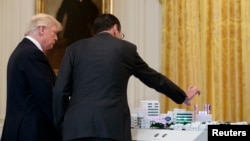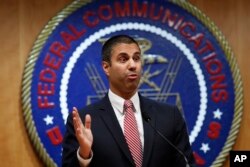The White House on Monday denied that any decision has been made about building a nationalized fifth-generation 5G wireless network to combat the threat of Chinese eavesdropping.
"Right now, we're in the very earliest stages of the conversation," White House Press Secretary Sarah Huckabee Sanders said during Monday's daily briefing. "There are absolutely no decisions made on what that would look like, what role anyone would play in it."
Sanders emphasized that the administration believes "in the need for a secure network."
According to a U.S. National Security Council memo, the next-generation wireless mobile phone and data network should be built and operated by the federal government to ensure that the Chinese government and other outsiders would not be able to intercept 5G telecommunications traffic.
The head of the government's regulatory body for telecommunications and the industry are pushing back against the proposal.
"I oppose any proposal for the federal government to build and operate a nationwide 5G network," said Federal Communications Commission Chairman Ajit Pai. "The main lesson to draw from the wireless sector's development over the past three decades — including American leadership in 4G — is that the market, not government, is best positioned to drive innovation and investment."
Pai says the proper role of the government is "to push spectrum into the commercial marketplace and set rules that encourage the private sector to develop and deploy next-generation infrastructure."
The FCC chairman argues that the government constructing a nationalized 5G network "would be a costly and counterproductive distraction from the policies we need to help the United States win the 5G future."
The four other FCC commissioners, including the two Democrats, are backing the chairman's stance.
"There is a worldwide race to lead in 5G, and other nations are poised to win," said commissioner Jessica Rosenworcel, a Democrat. "But the remedy proposed here really misses the mark."
AT&T, the world's largest telecommunications company, says the work to launch 5G service in the United States "is already well down the road" as a result of multibillion-dollar investments made by American companies.
"We have no doubt that America will lead the 5G revolution," according to a statement from the company, which is the second-largest provider of mobile telephone services in the country.
T-Mobile, a subsidiary of Germany's Deutsche Telekom, and Verizon are among others with significant investments in the United States for the development of their own 5G networks, which promise up to 100 times faster speeds than 4G and shorter lag times in transferring data.
In countries such as Japan and South Korea, testing of 5G networks is under way.
The technology still faces significant hurdles in harnessing millimeter wave bands and will require a massive number of smaller cell sites for required signal coverage.
Engineers point out that rain, snow and fog will hamper the range of 5G cellular signals, which also have more difficulty penetrating buildings than the frequencies used for current mobile phone systems.






